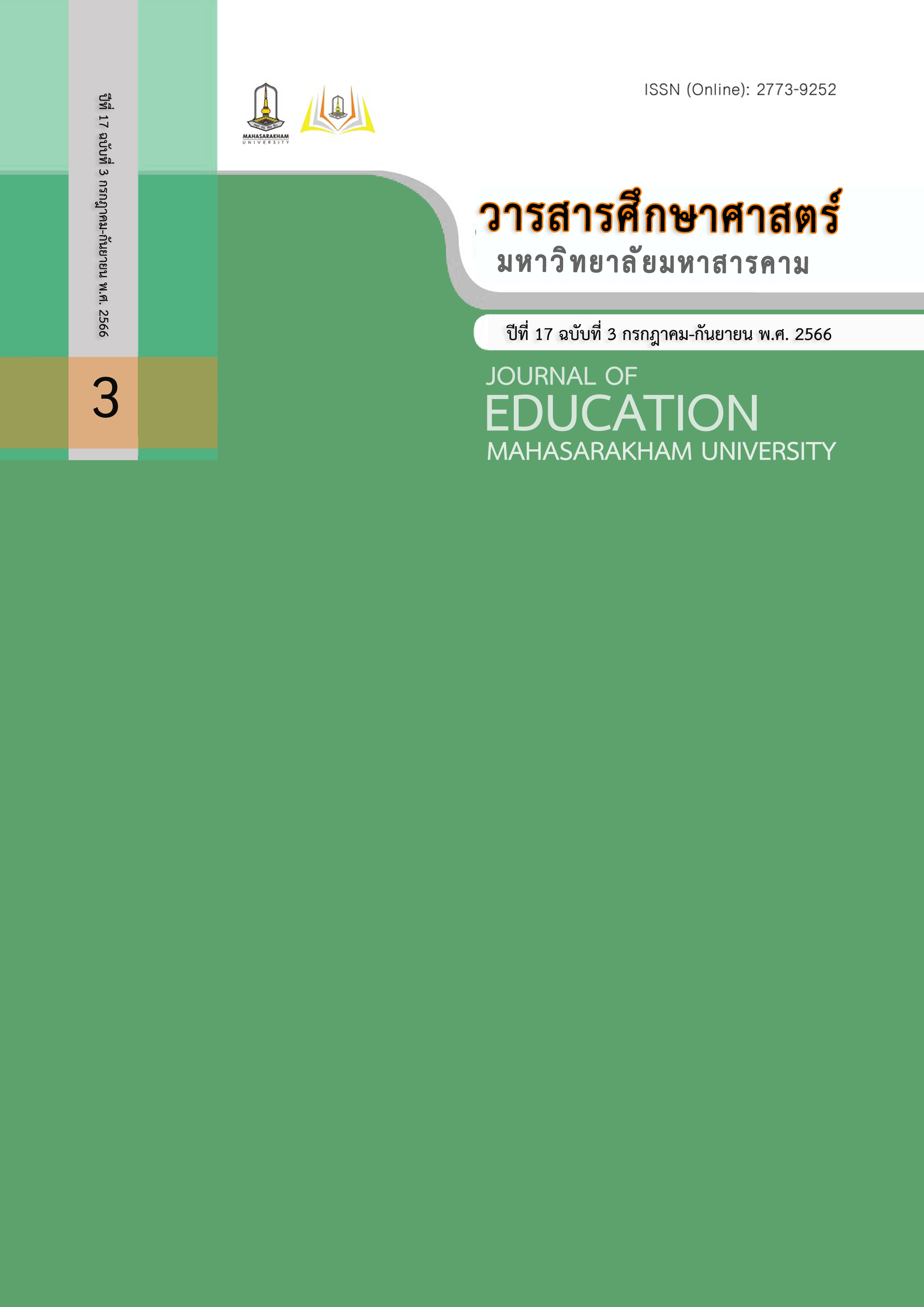EFFECTS OF ALCOHOL CONSUMPTION PREVENTION WITH HEALTH EDUCATION PROGRAM IN ADOLESCENTS
Main Article Content
Abstract
This quasi-experimental research aimed at determining the effectiveness of a health education program applied from the Health Belief Model and the Self-efficacy Theory on awareness of alcohol abuse prevention among adolescents. The samples of this study comprised 50 first-year students from the university where the researcher has taught and they were selected by voluntary selection - divided into experimental group and control group, 25 students each group. The instruments consisted of 1) the health education program applied from the Health Belief Model and the Self-efficacy Theory - eight activities four weeks were developed under the program by applying twice a week and one hour per day, with the validity of consistency index at 0.96, 2) the 40 questions rating scale questionnaire developed regarding the awareness of adolescents in order to prevent alcohol consumption with the content validity index at 0.97, the reliability coefficients of 0.95, and the item-total correlation between 0.22-0.68. Data were analyzed by descriptive statistics and t-test. It was found out that the health education program on alcohol abuse prevention in adolescents was effective assessed by the followings: 1) after the experiment, the score of the awareness of alcohol abuse prevention of the experimental group who received the program was significantly higher than the score before the experiment at the .05 level; whereas, the score of the control group was significantly lower than the score before the experiment at the .05 level, 2) after the experiment, the mean score of the awareness of alcohol abuse prevention of the experimental group who received the program was significantly higher than the mean score of the control group at the .05 level.
Downloads
Article Details

This work is licensed under a Creative Commons Attribution-NonCommercial-NoDerivatives 4.0 International License.
References
กัลยา โสนทอง และคณะ. (2561). ผลของโปรแกรมการลดพฤติกรรมการดื่มเครื่องดื่มแอลกอฮอล์ในวัยผู้ใหญ่. วารสารวิทยาลัยพยาบาลพระปกเกล้า จันทบุรี, 29(1), 78-91.
จุฬารัตน์ รวมจิต. (2565). ผลการใช้โปรแกรมการสอนทางกายภาพบำบัดตามรูปแบบความเชื่อด้านสุขภาพร่วมกับทฤษฎีความสามารถตนเองต่อระดับความเจ็บปวดและความสามารถทางกายของผู้ป่วยปวดหลังส่วนล่างเรื้อรังในคลินิกฝังเข็ม. วิทยานิพนธ์หลักสูตรสุขศาสตรมหาบัณฑิต, สาขาวิชาสาธารณสุขศาสตร์ มหาวิทยาลัยราชภัฏอุตรดิถต์.
ทิตาวดี สิงห์โค. (2563). ผลของโปรแกรมส่งเสริมการรับรู้ความเชื่อด้านสุขภาพต่อพฤติกรรมการป้องกันโรคหลอดเลือดสมองและการรับรู้ประโยชน์ของการคงไว้ซึ่งพฤติกรรมในผู้สูงอายุกลุ่มเสี่ยง. วิทยานิพนธ์หลักสูตรพยาบาลศาสตรมหาบัณฑิต, สาขาวิชาการพยาบาลผู้ใหญ่ คณะพยาบาลศาสตร์ มหาวิทยาลัยคริสเตียน.
นุสรา ศรีกิจวิไลศักดิ์ และ สิริมา มงคลสัมฤทธิ์. (2559). ประสิทธิผลของโปรแกรมการปรับเปลี่ยนพฤติกรรมการดื่มเครื่องดื่ม แอลกอฮอล์ในกลุ่มที่มีรูปแบบการดื่มแบบเสี่ยงต่ำหรือเสี่ยงสูง. วารสารสาธารณสุขมหาวิทยาลัยบูรพา, 11(1), 40-51.
ประไพรัตน์ คาวินวิทย. (2554). ปัจจัยที่สัมพันธ์กับปริมาณการดื่มเครื่องดื่มแอลกอฮอล์ของนิสิตปริญญาตรีมหาวิทยาลัยศรีนครินทรวิโรฒ. วิทยานิพนธ์ปริญญาเศรษฐศาสตรมหาบัณฑิต, สาขาวิชาเศรษฐศาสตร์การจัดการ มหาวิทยาลัยศรีนครินทรวิโรฒ.
ปัณณวิชญ์ ปิยะอร่ามวงศ์ รุ่งระวี สมะวรรธนะ และ เอมอัชฌา วัฒนบุรานนท์. (2560). การจัดโปรแกรมการป้องกันการดื่มเครื่องดื่มแอลกอฮอล์ ในนักเรียนหญิงมัธยมศึกษาตอนต้น กรุงเทพมหานคร. วารสารการแพทย์และวิทยาศาสตร์สุขภาพ, 24(1), 54-66.
พิชชานันท์ สงวนสุข. (2564). ประสิทธิผลของโปรแกรมเสริมสร้างสมรรถนะแห่งตนต่อพฤติกรรมการป้องกันโรคหลอดเลือดสมองในผู้สูงอายุโรคไม่ติดต่อเรื้อรัง อำเภอคลองขลุง จังหวัดกำแพงเพชร. วิทยานิพนธ์หลักสูตรสุขศาสตรมหาบัณฑิต, บัณฑิตวิทยาลัย มหาวิทยาลัยนเรศวร.
ศรัณยา บุนนาค และ อำนวย อินทสโร. (2552). รายงานการวิจัยเรื่องปัจจัยเสี่ยงต่อการเป็นนักดื่มสุราของนักศึกษาชายของมหาวิทยาลัยสงขลานครินทร์. [ออนไลน์]. แหล่งที่มา http://kb.psu.ac.th/psukb/bitstream/2010/7323/6/323889.pdf
ศรีเรือน แก้วกังวาล. (2549). จิตวิทยาพัฒนาการชีวิตทุกช่วงวัย: วัยรุ่น-วัยสูงอายุ. กรุงเทพฯ: สำนักพิมพ์มหาวิทยาลัยธรรมศาสตร์.
ศูนย์วิจัยปัญหาสุรา. (2550). ประชุมวิชาการสุราระดับชาติ ครั้งที่ 3 สุราไม่ใช่สินค้าธรรมดา. กรุงเทพฯ: ศูนย์วิจัยปัญหาสุรา.
ศูนย์วิจัยปัญหาสุรา. (2556). สถานการณ์การบริโภคเครื่องดื่มแอลกอฮอล์และผลกระทบในประเทศไทย ปี 2556. นนทบุรี: เดอะกราฟฟิกซิกเต็มส์.
สำนักงานสถิติแห่งชาติ. (2561). จำนวนนักเรียน นิสิต นักศึกษา. [ออนไลน์]. แหล่งที่มา http://statbbi.nso.go.th/staticreport/page/sector/th/03.aspx
สุชา จันทร์เอม. (2540). วัยรุ่น. กรุงเทพฯ: อักษรบัณฑิต.
สุปราณี น้อยตั้ง, ปัญญรัตน์ ลาภวงศ์วัฒนา และ ณัฐกมล ชาญสาธิตพร. (2561). ผลของโปรแกรมแบบแผนความเชื่อด้านสุขภาพต่อพฤติกรรมการป้องกันมะเร็งเต้านมของนักเรียนหญิงมัธยมปลายในเขตกรุงเทพมหานคร. วารสารพยาบาลสภากาชาดไทย, 11(2), 78-99.
อรพินทร์ ชูชม. (2552). การวิจัยกึ่งทดลอง. วารสารพฤติกรรมศาสตร์, 15(1), 1-15.
อโนทัย ฟุ้งขจร และ ยุวดี รอดจากภัย. (2559). ผลของโปรแกรมสร้างเสริมสมรรถนะแห่งตนต่อการรับรู้ความสามารถตนเอง ความคาดหวังในผลลัพธ์ และพฤติกรรมหลีกเลี่ยงการดื่มเครื่องดื่มแอลกอฮอล์ ของนักเรียนชั้นมัธยมศึกษาตอนปลาย อำเภอบ่อทอง จังหวัดชลบุรี. วารสารพยาบาลสาธารณสุข, 30(3), 41-55
เอื้อมเดือน ชาญชัยศรี. (2558). ผลของโปรแกรมการส่งเสริมสมรรถนะแห่งตนต่อพฤติกรรมการควบคุมระดับน้ำตาลในเลือดของผู้ป่วยโรคเบาหวาน. วารสารราชนครินทร์. มกราคม-มิถุนายน, 161-176.
Bandura, A. (1986). Fearful expectations and avoidant actions as coeffects ofperceived self inefficacy. American Psychologist, 41, 1389-1391.
Becker, M. H., & Maiman, L. A. (1975). Sociobehavioral determinants of compliance with health and medical care recommendations. Med Care, 13(1):10-24.
Çiftci, N., & Kadıoğlu, H. (2022). The effect of the health belief model-based educational program on physical activity beliefs and behaviors of university students. Journal of Public Health. [online]. https://doi.org/10.1007/s10389-022-01776-2.
Clark, C. K. (Ed.) (2005). Percentile (Vol. 3). West Sussex: John Wiley. Engels, R. C., et al. (2005). "Drinking motives, Alcohol expectancies, self-efficacy,and drinking patterns". Journal of drug education, 35(2), 147-166.
Kim, H., Shin, S., & Lee, E. (2022). Effects of Health Belief, Knowledge, and Attitude toward COVID-19 on Prevention Behavior in Health College Students. Int. J. Environ. Res. Public Health. 19(3), 1-11.
Medinnus, G.R. (1969). Child & adolescent psychology: behavior and development. New York: John Wiley & Sons,
Nolen-Hoeksema, S. (2004). Gender differences in risk factors and consequences for alcohol use and problems. Clinical psychology review, 24(8), 981-1010.
Rovinelli, R. J., & Hambleton, R. K. (1977). On the use of content specialists in the assessment of criterion-referenced test item validity. Dutch Journal of Educational Research, 2, 49-60.


